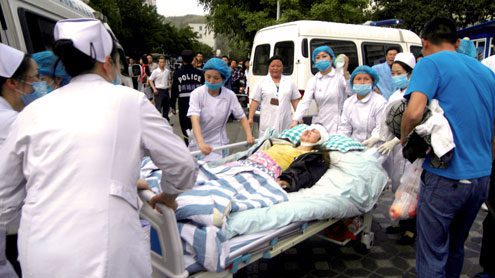Survivors Recount War’s Horror
Imagine having only minutes to flee your home–not even time to pull the baby’s clothes off the line. If you were lucky, you escaped the grenades, the shooting, the shelling. If you were very lucky, you escaped with your life…maybe, like Milka Rados, by being yanked through the window of a bus.
Friends pulled Milka, 26, and her mother into the bus as it was speeding out of town. “I’ve always been sorry I’m small. Now, I’m glad–I could fit through the window. I heard guns and grenades and shooting outside our apartment and went out and asked the crowds where they were going. ‘We don’t know!’ they said. It was horrible. There was no time to take food, my I.D. card, anything. It was so crowded on the bus we couldn’t breathe. It was an eternity.”
The nightmare began for Salvation Army employees Roger Markic, Davor Kopanja, Srajan Milicic, Susan Balac, Branslav Lujic, and Milka around 5 p.m. on September 9, 1995. After a month of almost daily shelling by Croat forces tanks, lobbed from the hills surrounding Sipovo, word suddenly came that everyone should flee. Within two hours the town of 15,000 had emptied–by car, bus, foot, bicycle, and cart–squeezed into a frantic, panic-stricken line stretching for miles down the twisty, two-lane road leading out of Sipovo. Among them was an 80-year-old woman pushing a wheelbarrow filled with belongings, a farmer with his sons driving 100 head of goats, and an 8-year-old boy driving a tractor.
“It took five days to reach Banja Luka,” recalls Davor, 23. “It is normally a one hour trip. They were bombing the roads and I passed lots of dead people and abandoned cars. I drove my mother and sister in our car–they can’t drive.”
Croat forces occupied Sipovo from September until early February 1996. Apparently, most of the destruction and looting in the area was done as the forces left. Then, hay would be piled in the top floor of a home and flammable liquids poured on before it was set on fire–with the intent of collapsing the roof. At the same time, they turned on water pipes, creating thick sheets of ice on stairs and floors as the water froze.
But the horror didn’t end when the Croats left. Roger, 26, squeezed into a small storage room with his parents, wife, and two small children for many months after they returned. He remembers the day he came back to Sipovo. “I went to my grandfather’s house and saw my baby picture on the wall. It was difficult. Then, I went to my house. I was stunned at the destruction. I couldn’t talk for half an hour. I asked, ‘Why? Why can’t I be normal like everyone else?’ It is so difficult to be a refugee, to have nothing.
“Before the war you could go anywhere, sleep anywhere, you didn’t have to lock your car. It was good and free and open for everyone. We lived with Muslim and Croat neighbors before the war. Everyone has lost in this war.”
Branslav, who returned when the town was still smoking, tries to stay optimistic about the future. “People couldn’t survive if they always thought about the war. As I repair my house, I think of other things. I think tomorrow is a new day.”











